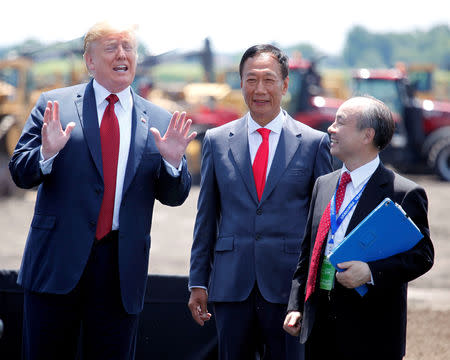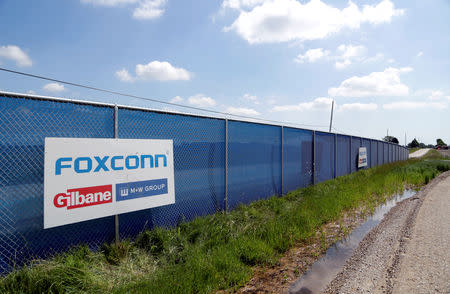Wisconsin governor says he wants to renegotiate Foxconn contract
By Karen Pierog and Caroline Stauffer
(Reuters) - Wisconsin's governor said on Wednesday he wants to renegotiate the state's contract with Foxconn Technology Group for investment incentives because the Taiwanese company is not expected to reach its job creation goals for the state.
Democratic Governor Tony Evers, who took office in January, inherited a deal to give Foxconn around $4 billion in tax breaks and other incentives that was championed by Scott Walker, Evers' Republican predecessor.
Announced at a White House ceremony in 2017, Foxconn's 20-million-square-foot campus marked the largest greenfield investment by a foreign-based company in U.S. history and was praised by President Donald Trump as proof of his ability to revive American manufacturing.
Foxconn, a major supplier to Apple Inc, has pledged to eventually create 13,000 jobs in Wisconsin, but said earlier this year it had slowed its pace of hiring.
"The present contract deals with a situation that no longer exists so it's our goal to make sure that the taxpayers are protected and environmental standards are protected, and we believe that we need to take a look at that contract," Evers told reporters.
He said it was premature to discuss specific changes to the contract. Foxconn representatives did not immediately comment.
Evers' comments came hours after Foxconn Chairman Terry Gou announced he was running for president of Taiwan. Gou told Reuters on Monday he planned to step down from Foxconn, the world's largest contract manufacturer, to pave the way for younger talent to move up the company's ranks.
Foxconn, formally known as Hon Hai Precision Industry, said in a statement on Tuesday that Gou would remain chairman, though he planned to withdraw from daily operations.
Evers said the footprint of the project is going to be much smaller than the original, but the scaled-back project is expected to advance "whether Mr. Gou is part of that enterprise or not."
AN "IRONCLAD" CONTRACT
The company has wavered on its goals for the $10 billion project this year. Louis Woo, special assistant to Gou, told Reuters in January that Foxconn was reconsidering plans to make advanced liquid crystal display panels. He said Foxconn would hire mostly engineers and researchers rather than the manufacturing workforce originally promised in Wisconsin.
Days later, the company said it would build the factory after Gou spoke with Trump.
Evers had criticized the Foxconn deal during his campaign for governor.
"Since the election, I have been concerned that Governor Evers would try to undermine the state's contract with Foxconn," Robin Vos, speaker of the Wisconsin State Assembly and a Republican, said in a statement. He said the existing contract negotiated by the state's economic development arm was "ironclad."
The head of the Wisconsin Economic Development Corporation (WEDC), an organization created by Walker in 2011, said he has frequent discussions with Foxconn.
"These ongoing discussions include consideration of the effect the company’s evolving plans may have on WEDC’s contract and our steadfast commitment to protect the taxpayers of Wisconsin," WEDC Secretary and Chief Executive Mark Hogan said.
To qualify for tax credits Foxconn must meet certain hiring and capital investment goals under the current contract. It fell short of the employment goal in 2018 - hiring 178 full-time workers rather than the 260 targeted and failed to earn a tax credit of up to $9.5 million.
Foxconn has a history of walking back on investment plans in the United States and elsewhere.
“His track record for promising investments and then not following through is real," Douglas Paal, who served as U.S. representative to Taiwan from 2002 to 2006, said of Gou. "His current investment plans for Wisconsin have generated a level of controversy, but he has people who seem sincerely trying to make it come about.”
(Reporting by Karen Pierog and Caroline Stauffer; additional reporting by David Brunnstrom in Washington; writing by Caroline Stauffer; editing by Tom Brown and Leslie Adler)




